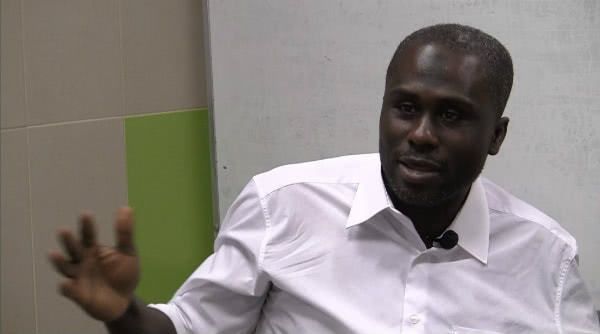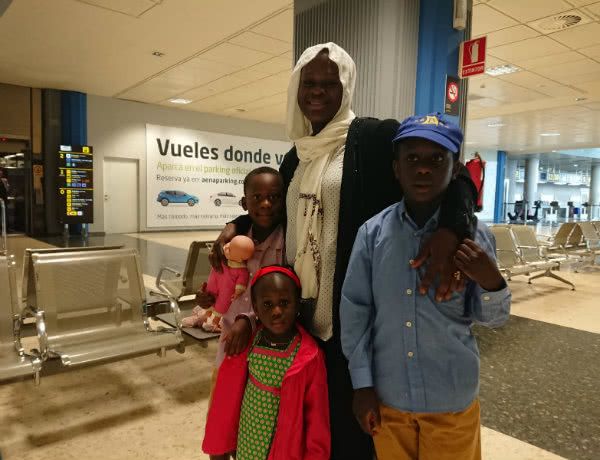Almost two decades have passed since then. Garba’s hands are no longer those of an adolescent. Now they move with extreme agility over the keyboard of his PC, which he can take to pieces and reassemble with the precision of a surgeon and where he types commands indecipherable for the initiated. Garba has turned into an expert IT repair man. Now he is married with three children. He lives in Valencia in Spain and gives part of his earnings to help in the training of others of his family, and to send money back to Africa to support his mother.
The hands with which he held his grand-mother when he left Togo and with which he repairs computers are the same with which he fought for his life when he clung to a rock as the dinghy he was travelling in to Fuenteventura (Canary Islands) capsized.
They are the same ones that prevented him from being swallowed alive by an enormous snake while he was asleep in the bush on his long trek to Morocco. They are the very same with which he worked cutting hair and making shoes several years in North Africa to raise money to pay the cartels that helped him cross the ocean to his future life. But something has changed for the better and forever.
His life could have been very different. When he arrived in Valencia he had only seven euros in his pocket and one idea in his head. “My plan was to sell drugs and earn a lot of money,” he admits. Quick money to get ahead. But his plans changed. Two things changed them. The first was to see a junkie knocked down in the street looking like a dead monkey. “He looked like rubbish that no-one wanted” he recalls. The second was to meet up with people from Xabec.

Born in Sotouboua (Togo). When he was eight his father died. His mother remained alone with the eighteen children from different marriages. He emigrated to Ghana where his maternal grandmother lived, but she had very few means to feed and clothe him. At 14 he decided to go off on his own. He spent four years crossing Senegal, Algeria, Morocco and Mauretania, working as a barber and shoe-maker. In 2002 he managed to get a place on a dinghy crossing to Fuenteventura; half of his fellow-travellers drowned in the crossing. He reached Valencia with his 17 years and 7 euros in his pocket. Then he came in touch with Xabec.
“I am not a Christian but the Blessed Virgin appeared to me” he tells me, his eyes sparkling with joy. Xabec is a technical and training College in Valencia, for people with little or no resources, and set up and run by people of Opus Dei. “Everything began in Xabec. There they give you professional and human formation: how to live as a proper human being. They are simple, straightforward people, ready to help and tell you how things are done. This is what I call real respect for people”, he says.
Garba is a Moslem, and a co-operator of Opus Dei. “I try to do things well. I have grasped this message from the people of Opus Dei. And here no-one has asked me to change my religion and become a Catholic. That is why I have stayed here and work together with them”, he explains.

In Xabec he has found only friends and respect for his beliefs. Fr Baltasar, the priest of the school, cooks tasty paellas (typical dish of rice, chicken, fish and vegetables served in a big pan), but he was smart enough to buy halal chicken so Garba could also partake with the others. “These are details of respect”, he gratefully recalls.
“Opus Dei is very easy to understand. Its message is to work and do things well; and look after the others”
And he emphasizes this last point. “But sometimes”, he says,"we have our little prejudices and there are people who think that Opus Dei is ‘hands up or I shoot’. But I know they are very wrong”.Garba would like there to be many Xabec’s, especially in Africa. “I was looking for something like this. Because if you study, you will get ahead. What matters is for people to get formation, so that with work and effort they will improve their lives”.

This is why he believes that such initiatives as Harambee are needed for the future of Africa. “What my country needs is not food”, he says without mincing words, “but education, projects like this one to improve living standards, and for people to get training and learn skills. If we were given our chance and there were less corruption, everyone would want to remain in Africa. No-one would think of getting out in a dinghy.”
As he talks, Garba gesticulates with his hands. He would like many more hands to give fresh life to Africa. And to take Xabec to Togo and many other African countries, and fill the place with opportunities. That’s his wish: to prevent his countrymen risking their lives crossing the waves of the Atlantic in search of the kind of life he has managed to get; and so that no-one will ever have to run away from his country in a dinghy.